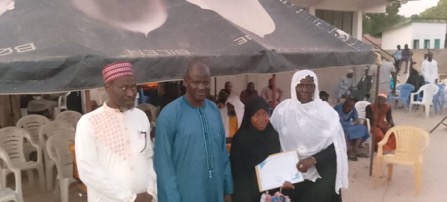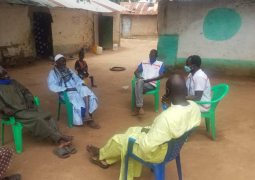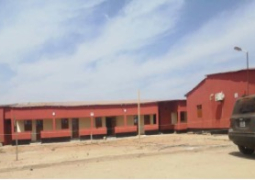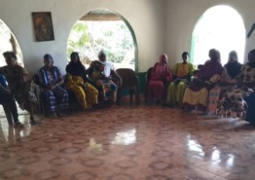
The annual islamic confab is designed to assess student’s understanding of Quran and Hadith, while at the same time creating opportunity to talk about other important topics affecting the Muslim ummah.
Established in 2008 with fewer students, the institute has since undergone remarkable growth with a growing student population numbering close to one thousand students. Further, this year’s event witnessed the awarding of a certificate to Khadijah Camara, an outstanding student, who has memorised the Qur’an.
In an interview with The Point, Bakary Ndure, Public Relations Officer of the School Committee, referenced to the historical journey of the school since inception to the date, recalling the achievements and challenges thus far.
He revealed that the institute came about as an initiative when some members of the community saw the need to have a school to enable their children access Islamic education in their own community.
This, he added, was designed to lessen the burden on parents, especially those who can’t afford to provide transport fares for their children to access education elsewhere within the Greater Banjul Area.
‘Students accessing Islamic education in our community was a great challenge for us and we decided to join our hands and resource together to set up this institute.
We started with nothing as initiators but through commitment and dedication we challenged ourselves to contribute to whatever resources available.’ This was to ensure that they kick start the project.
Fast-forward, Ndure acknowledged that their vision and commitment paid dividend, looking at the rapid growth that has taken shape at the school.
We first built six classrooms and the number of enrolments among students in the area was overwhelming. Initially, the school started lessons with 15 teaching staff and now has over 40 teachers with a student population of over nine hundred students.
He, also acknowledged the contribution of government in strengthening education in the community, noting that a testament to the fact is the sponsoring of standard classrooms at the school.
He thanked all those who contributed to the growth of the school, saying their support has enabled the school to have its own centre for memorising the Holy Qur’an.
Further, he launched an urgent appeal to all those with the means to help them complete some of their unfinished project, which he said, is the ongoing construction of additional blocks to meet the growing demand.
Samba Bah, chairman of the Board of School Committee, expressed appreciation with the development currently taking shape at the school. However, he noted that there still need for more work to be done in constructing additional classrooms to meet the growing number.
The school, he said, teaches both Arabic and English courses with plans to expand to up to grade 12.
Muhammed Lamin Chatty, principal of the school, expressed similar sentiments. He commended their student who just memorised the Holy Qur’an for their brilliance, while extending admiration to those who contributed to that success.
He also spoke at length on the rapid transformation the school has undergone in recent years and called for more support to enable them achieve their desired target.
Presenting on the importance of women memorising the Holy Qur’an, Oustas Alhagie Kemo Ndure, who was the guest speaker, highlighted the crucial role of women in propagating Islam, which he said, dates back to time immemorial.
He called on Muslims to always fear Allah and follow the teachings of the holy Prophet Muhammed SAW.
Oustass Ndure reminded that learning the Qur’an should not be seen as a male domain, clarifying that women also have a stake in learning and propagating the teaching of the holy book.
The erudite Islamic scholar pointed out that the importance of women memorising the Qur’an, who he said, are custodians when it comes to family settings, thus put them at a vantage point to perfectly translate and nurture the teaching of Holy book among their children.
Ndure spoked at length on the importance of women learning the Holy Qur’an to enable them effectively translate the teaching of the Holy Book to their family, thus challenging parents to encourage their girl-child to learn more about the Holy Book.





